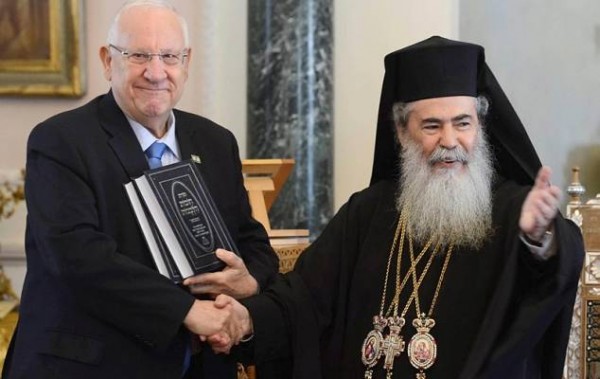Although the president’s office invites Christian leaders to the president’s house for an annual Christmastime reception and other official occasions, it has been many years since an Israeli president has met Christian officials on their turf and the first visit of an Israeli president to the Greek Patriarchate in more than 30 years.
Jason Pearlman, Rivlin’s foreign media adviser, said the president’s decision to travel to the patriarchate, located in the Old City of Jerusalem in the eastern part of the city, reflects the president’s ”agenda to reach out and build dialogue” with Israel’s diverse religious and ethnic communities.
By all accounts, Rivlin, who is Jewish, has made outreach to Israel’s many minorities a priority. The first official visit he made upon taking office in July 2014 was to an Arab municipality. Arabs comprise about 20% of Israel’s population, and most of Israel’s Christians consider themselves part of the Arab community.
In his speech, Rivlin told church officials that Israel takes acts of vandalism against church-owned property very seriously. In recent years, Jewish nationalist extremists have allegedly damaged church property and spray-painted anti-Christian slogans on Church-owned institutions.
The same groups of vandals are believed to have carried out numerous attacks against Muslim-owned and Arab-owned property in revenge for the Israeli government’s unwillingness to build new Jewish settlements and limit building within existing settlements.
Both Christian and Muslim leaders have accused the Israeli government of not doing nearly enough to prevent the attacks or punish the perpetrators.
‘Freedom to Worship’ Commitment
Rivlin told the Christian leaders that “an attack on your holy sites is like an attack on our holy sites, and such crimes must never be allowed to happen.”
He said that “religious freedom is a value dear to the state of Israel as a Jewish and Democratic state. I am proud of our obligation, and I reaffirm that obligation to freedom of worship for all denominations and communities. We shall not allow hate crimes against people or buildings of faith.”
Israel’s law-enforcement officials “must deal with such crimes accordingly,” he said, clearly intimating that they are not doing enough to stem the attacks.
The president said the people of the region live in a “complex political and religious reality,” especially in Jerusalem, which he called “the microcosm” of the Middle East.
Rivlin said that communications between the churches and the Israeli government are vital, especially during these tense times in the region.
“It is our shared duty to have proper and respectful communication between us. For many years, our relations have been kept through the [religious] status quo,” he said, referring to an 18th-century Ottoman decree that codified which holy sites belong to which religious groups and denominations. It is largely based on agreements between the various faiths not to alter the sites or claims to the sites in order to keep the peace.
The president called the status quo decree “not only a formal obligation but an expression of understanding … of the delicate balance of living in a diverse community. I believe that, despite the differences and challenges, we can all establish trust, partnership and mutual respect as people of faith.”
The Patriarchs’ Responses
Despite the Israeli government’s attempts to accommodate the needs of different faiths, Catholic leaders have long been at odds with the government over the issue of church property taxation and the government’s reluctance to issue visas to Christian clergy and seminarians, especially from Arab countries.
Following the president’s address, Archbishop Fouad Twal, the Latin patriarch of Jerusalem, said, “We pray that, during your term in office, peace will be implemented between peoples, based on justice, dignity and security.”
Patriarch Twal noted the “great threat” facing Christian communities in the Middle East and said there is “an embarrassed silence” about Christians “being crucified, beheaded, stoned and shot in country after country.
“We must lament the slaughter of Christians in the presence of the indifference of world leaders. We hope and pray that God will impart peace on our peoples in the Middle East and across the world,” the patriarch said.
But, Patriarch Twal continued, “[just] as we condemn anti-Christian persecutions, we equally condemn anti-Semitism as a crime, in the same way we condemn Islamophobia.”
Greek Orthodox Patriarch Theophilos III told Rivlin the leaders were “grateful for his visit during this season when the Christian community is celebrating the festival of Pascha (Easter). The close relationship between Passover (Pesach) and Easter (Pascha) is an important reminder to us all, of the deep bonds that unite the children of Abraham. Jews, Christians and Muslims have lived here side by side for centuries.”
“In the turbulent current situation in the Middle East,” Patriarch Theophilos said, “we know there is no better alternative than to live together in genuine harmony. We wish to acknowledge and commend you, Mr. President, for the strong stance you have taken against religious bigotry of any kind and for the actions you have taken against crimes targeting religious shrines, monuments and holy places.”
Two Dimensions: Religious and Political
In an interview with the Register following the event, Auxiliary Bishop William Shomali of the Latin Patriarchate said the Israeli president’s visit had two dimensions: one political and the other religious.
“The religious one is to make the Christian leaders feel that Israel is aware of their importance and needs,” he said. “The other one is to assert Israeli authority over the Old City of Jerusalem,” located in East Jerusalem, which Israel annexed following the 1967 Middle East War.
The Palestinians, which are both Christian and Muslim, claim East Jerusalem as the capital of a future Palestinian state. The Israeli government has vowed to never relinquish the Old City, where the Western Wall, Temple Mount, Al Aqsa Mosque and Church of the Holy Sepulcher are located.
“As leaders, we looked only at the religious aspect and did not pay attention to the political one,” Bishop Shomali said. “We leave that to politicians.”
Michele Chabin is the Register’s Middle East correspondent.














